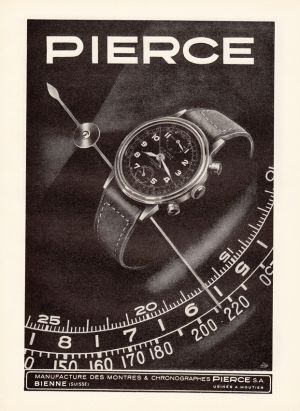PIERCE

Pierce Watch Company
Pierce is a Swiss watch manufacturer.
The watch company Pierce was founded in 1883 in Biel (Switzerland) by Leon Levy and his brothers under the name Léon Lévy Frères Manufactures des Montres et Chronographes Pierce SA. In 1910 they already employed 1,500 employees - when at the same time approximately 24,000 inhabitants lived in Biel.
From the 1930s Pierce produced in series the first self-developed calibre. The Royal Air Force awarded the contract for the development and construction of the pilot's watch Flight Calendar. In 1956 Pierce presents the mechanical alarm wristwatch Duofon. The name refers to its ability to deliver the alarm signal in two volumes, loud or silent. A window in the dial indicates the selected setting.
Because of their reliability and robustness the watches of the brand with the well-known logo, the Greek “Pi”, enjoy a good reputation.
Even during the quartz crisis in 1970, the company remains faithful to the principle of the purely mechanical watch and sees no need for a change.
A Movement Manufacturer
In 1883 the Lévy brothers created “Léon Lévy Frères Manufactures des Montres et Chronographes Pierce SA” in the bilingual city of Biel/Bienne, Switzerland. Fast forward twenty-seven years and, in 1910, 1,500 of the town’s 24,000 inhabitants were employees of the company. Clearly, Pierce was already a big player in the industry. During the 1920s, Léon Lévy was approached by Ebauches S.A, who wanted Pierce to join the consortium. Léon, however, had a completely different direction in mind for his brand, and he refused the offer, allowing him to stay independent. This independence came at a cost: blacklisted by all the suppliers, Pierce couldn’t borrow or use pieces from the consortium companies, forcing the brand to come up with and develop their own manufacture calibres. As a result, Pierce invented more than 30 different calibres throughout the company’s history, two of them being chronograph movements.
By the mid-1930s, Léon felt the need to create an affordable chronograph for the masses, a particularly difficult mission considering the price of these complications at that time. Starting from scratch, he designed a movement (Calibre 130) built around a central wheel, enabling him to get rid of many springs and levers and consequently cut costs. Léon also invented a vertical friction clutch to engage the chronograph. Although frequently used in the watch industry today, it was a first at that time.
However, this strange yet ingenious architecture forced him to place the two registers in a 12 and 6 o’clock position, creating a rather unusual dial layout. The first watch sold with this calibre was launched in 1936 and became an instant success. In 1939 a two-pusher version came out and, a few years later, it became the official watch of Trans Caribbean Airlines pilots. After that, the British Royal Airforce placed an order for fighter pilots and other aviation personnel. At a certain point, the company decided to use plastic for the central wheel. Although hyped as a revolutionary material back in the day, it was mostly a way for the company to get cheaper parts. That decision is today considered a mistake, as the plastic weakened the entire movement and sometimes led to the destruction of the wheel itself. For watchmakers, it was a nightmare to repair; for collectors, it became the perfect watch to bully.
